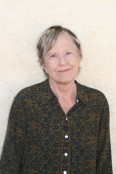“We create and consume representations of the world.”
RAE ARMANTROUT
Interviewed By: Kaveh Akbar
Dickinson is obviously a very important poet for you – if she were around today, which of your books/poems do you think she'd find most intriguing? Which would you point her to if you really wanted to dazzle her?
That's a good question - or it's a trick question because I can't imagine dazzling Dickinson. That said, I think the woman whose life had stood a loaded gun until mysteriously authorized to fire "its pleasure through" like a "Vesuvian face" might appreciate my poem "Mother's Day" (in Just Saying) where
I wring the last
sweetness
from syllables
and consume it before you.
You've written that you don't believe “narrative is any more natural than a sonnet,” your rationale being that a (mentally sound) person doesn't walk around narrating their moment-to-moment personal experience to themselves any more than they think in rhymed fourteen-line bursts. I do often feel that when reading your work, the language is somehow closer to the actual experience of cognition, of being a series of keystones demarcating experience or abstract reasoning, allowing us to “inhabit it / long enough to look around” without deadening it by being overly expositive. Is working toward the process of emulating human thought ever a deliberate goal for you?
In a way. I mean I try to capture my own thought process and/or my perceptions. The way perceptions are juxtaposed can mimic thought. Often a poem begins when I see or hear something that sort of stops me. I write it down and then say to myself ("aloud" in what might turn out to be a poem) - what was it about that? Why does that bother or attract me? Sometimes one such moment generates another until I'm having a kind of conversation with myself.
Speaking of conversations with yourself, Versed was written while you were battling a diagnosis of cancer, and some of the poems feature moments of narrative clarity uncommon in your work (from “Together”: “Two people, a doctor and a nurse, come at intervals to tell me whether I will live or die. They do this with practiced solemnity.”) Do you think these moments may have helped open your work up to a larger audience, especially to people who wouldn't normally be readers of poetry?
I suppose so. I think some people bought the book because they were aware of its provenance. Actually, only about half of the book was written after my diagnosis. Still, I think it's really quite possible to see a kind of foreshadowing, if you will, in poems written before I knew I was sick - such as "Later," "Worthwhile," "Presto,' and "Operations." Take a look and you'll see what I mean. It's eerie. I think my body knew something my conscious mind did not. Anyway, back to your question. The poem closest to the experience of illness, "Own," I actually started while I was still in the hospital. So that one is very fresh and raw. Other poems, such as, say, "Integer," mix cancer in with other phenomena - dark matter, a threatening message from my phone company. Some people (and I'm going by the Amazon reviews here) were upset to discover that this was not a standard account of illness and recovery, etc.
An obsession with taxonomy, with the names of things and what it means to give a name, abounds throughout your work. From “Greeting,” “I miss circumstance / already – // the way a single word / could mean // necessary, relative, / provisional // and a bird flicks past / leaving // the sense that one / has waved one's hand.” From “Representative,” “White veined / with wandering blue; // blue seamed / with white. // That heaven could be built / out of the names of gems! // “Agate” and “Amethyst.” // What did they represent?” Is this a conscious preoccupation, something you think about in your day to day life as well?
That's true - though I hadn't thought of it as taxonomy before! But who isn't interested in (or obsessed with) representation these days? As modern humans, we create and consume representations of the world and representations of representations. It's also true that I enjoy the ambiguities inherent in language. And I enjoy the play of resemblance and difference in words. I think probably all poets do but maybe I foreground it more than some or I play with it deliberately. Sometimes I play with etymologies. A publication called The Writer's Thesaurus asked me to define a word of my choice. I chose the word "spurious" and basically wrote a specious definition of it. That was a lot of fun. I got a poem called "And" (from Just Saying) out of the exercise.
Just Saying, as a title, reads like a sort of ars poetica in miniature. It's a phrase used to evoke some unpleasant reality, and then immediately diminish that evocation. It also sort of calls into question the value of language altogether, points to spoken language as a clumsy approximation of thought (and written language as a clumsy approximation of spoken language, twice removed from its source). I'm trying to avoid simply asking "How did you pick such an amazing title?" I guess my question is, to what extent is it actually a commentary on the speakers in your poems, on their credibility? On the credibility of poetry in general?
Good question again! Yes, the phrase "just saying" is both insistent and dismissive. I guess I like that contradiction. I'm (often) pointing out what the culture is saying, mimicking its tonalities. But, beyond the ordinary meaning of the phrase "just saying" I did want readers to hear the literal meaning. These are only words, my attempt at telling you something - but language, powerful as it is - still falls short of what it aims at.
In Patricia Lockwood's hilarious and brilliant “Is it Work?” she playfully discusses the styles of different poetic heavyweights (“Elizabeth Bishop only ever wrote one poem, a villanelle about an elk breaking up with her (“The Elk Breaks Up with Me”), and if I may say so she did very well with it.”) In it, she writes, “Is a poet who writes short poems working less than a poet who writes long ones? In my opinion, no. The average Rae Armantrout poem is three words long—cut from four thousand.” She's joking, but I've always felt like your poems read as though meticulously carved out of some much longer piece. Do you ever work this way, writing a very long poem and then whittling it down?
I whittle down a bit - but, no, I never write a really prolix poem. What is more true is that I can go through ten versions of a four line stanza, each substantially different, before I settle on one. So almost every one of my poems (there are exceptions) has numerous doppelgangers or evil twins.
Interview Posted: September 1, 2014
MORE FROM DIVEDAPPER. (Drag left)





















































































